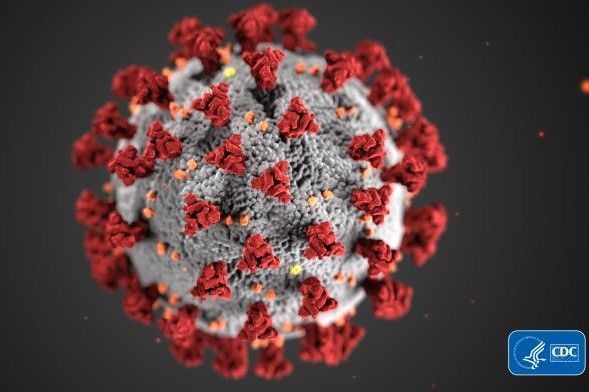
Long COVID is a chronic condition in which symptoms last for over three months after a COVID-19 infection. (CDC/Alissa Eckert, MS)
Nearly five years since the onset of the COVID-19 pandemic, researchers are starting to better understand long COVID. But there are still many unanswered questions about the condition.
Long COVID is a chronic condition in which symptoms last for over three months after a COVID-19 infection. Symptoms can last for years.
In 2022, the Regenstrief Institute in Indianapolis received $9 million from the Centers for Disease Control and Prevention to study long COVID.
“Estimates vary a bit among population groups, but about 6.9 percent of adults experience long COVID and around 1.3 percent of children experience long COVID symptoms,” said Dr. Shaun Grannis, vice president for data and analytics at the Regenstrief Institute.
“Part of the work that we're doing, that we're funded by the CDC for, is to update those estimates again, because we're still understanding exactly which symptoms are related to long COVID,” Grannis said. “We want to better understand how to support patients and minimize the side effects or consequences of long COVID.”
The study looks at patient health data to determine how many people were infected by COVID and for persistent symptoms.
Symptoms include fatigue, brain fog, dizziness, gastrointestinal issues, heart palpitations, and more.
“So far, this list has included over 200 symptoms, and so that can be really hard to diagnose, and a lot of them might be non-specific, so it's very hard for people to make those connections,” said Graham McKeen, director of public and environmental health at Indiana University’s Office of Environmental Health and Safety.
These symptoms can also cause other illnesses or disabilities to develop.
“A recent study showed that patients who are hospitalized for severe COVID have an increased risk of major cardiac events like heart attack, and that risk is as high as if they had a medical history of heart disease, meaning a severe hospitalization for COVID, puts you in the same risk category as someone who has a history of heart disease,” Grannis said.
Anyone who has had COVID-19 is at risk for long COVID.
“People who have experienced more severe COVID-19 illnesses, those who are hospitalized or need intensive care are more at risk for long COVID,” he said. “People with underlying health conditions, multiple health conditions, like diabetes, hypertension and those who are 65 years and older, and we also know that people who did not get a COVID -9 vaccine are at higher risk for long COVID.”
Read more: COVID-19 'will not ever go away', public health expert says
Research shows some demographics are more at risk than others. Women are more affected than men, and Latino and Hispanic people are also affected more frequently.
A recent study from Northwestern Medicine said young and middle-age adults have worse long COVID symptoms than older adults.
According to that study, long COVID “principally affects adults in their prime, contributing to profound public health and socioeconomic impacts warranting dedicated resources for prevention, diagnosis and interventions.”
McKeen said that puts younger people at a higher risk.
“They now have a full lifetime ahead of them of COVID infections and repeat infections and basically playing Russian roulette in terms of their risk and chance of them developing long COVID sometime in their lifetime,” McKeen said.
Grannis said long COVID appears to present itself differently in children compared to adults.
“Children may actually experience unique symptoms like rashes and phobias, and so it's important to think about age-specific approaches to long COVID,” Grannis said.
Currently, there is no clear treatment for long COVID. But researchers are working to find more answers.
“Part of the reason that nationally, the NIH and the CDC and others are enrolling patients in studies is to better understand and begin to try some more basic treatments,” Grannis said. “There's no known cure for this right now, but we want to better understand how to support patients and minimize the side effects or consequences of long COVID.”
McKeen said prevention starts with source reduction. Trying to avoid COVID-19 infections by masking, getting vaccinated, and staying home when sick will reduce the risk of contracting long COVID.








